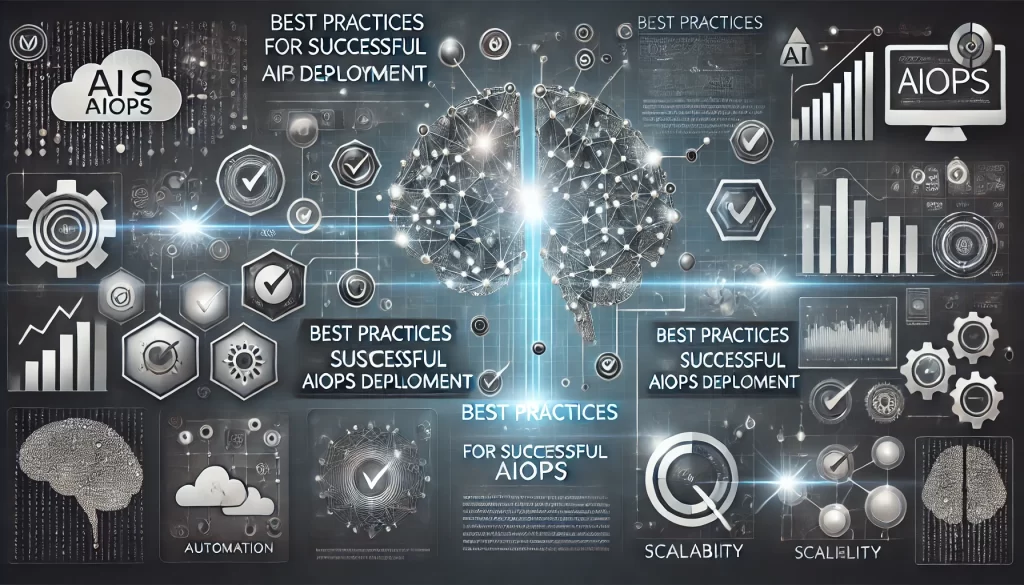
In the ever-evolving IT landscape, where managing infrastructure complexity is a challenge, AIops (Artificial Intelligence for IT Operations) emerges as a game-changer. By harnessing the power of artificial intelligence, machine learning, and big data analytics, AIops enables businesses to proactively monitor, analyze, and optimize their IT environments. However, deploying AIops successfully requires a well-structured approach and adherence to proven best practices. This blog explores these practices and highlights resources for training, certification, consulting, and support to ensure a smooth AIops deployment journey.
The Importance of AIops in Modern IT Operations
Traditional IT management methods struggle to keep up with the growing complexity of hybrid clouds, microservices, and real-time data streams. AIops bridges this gap by automating manual processes, providing actionable insights, and predicting issues before they escalate. Research by Gartner highlights that by 2026, over 50% of enterprises will use AIops platforms to enable real-time insights and automate decision-making in IT operations.
A successful AIops deployment doesn’t just optimize IT operations but also empowers organizations to enhance user experience, minimize downtime, and reduce costs.
Best Practices for Successful AIops Deployment
1. Define Clear Objectives
Start your AIops journey by identifying the key challenges in your IT operations. Common objectives include reducing alert fatigue, minimizing mean time to repair (MTTR), and improving system reliability. A clear understanding of these goals will guide your deployment and ensure alignment with business needs.
2. Invest in Data Quality and Integration
AIops relies heavily on high-quality, comprehensive data. Best practices for data management include:
- Centralized Data Aggregation: Collect data from all IT sources, including logs, performance metrics, and event data.
- Data Normalization: Standardize data formats to ensure consistency and accuracy.
- Integration Across Tools: Ensure seamless integration with existing IT service management (ITSM) platforms, monitoring tools, and cloud services.
3. Choose the Right AIops Platform
Not all AIops platforms are created equal. Evaluate platforms based on their ability to:
- Analyze real-time data.
- Provide actionable insights through predictive analytics.
- Automate incident response and workflows.
Popular platforms like Datadog, Elastic, Splunk, and Prometheus offer diverse capabilities. For training on these platforms, individuals and companies can leverage resources from theaiops.com, which provides specialized AIops courses and certifications.
4. Start with a Pilot Program
Deploy AIops in a small, controlled environment before scaling it across your organization. This pilot should focus on critical systems or use cases, such as:
- Monitoring application performance.
- Detecting anomalies in network traffic.
- Automating repetitive IT tasks.
Analyze the results to identify areas for improvement before rolling out AIops at scale.
5. Foster Collaboration Between Teams
AIops requires collaboration between IT operations, data scientists, and AI engineers. Establish a cross-functional team to oversee deployment and ensure that everyone understands their roles. This collaborative approach bridges the gap between technical expertise and operational goals.
6. Train Your Team
AIops is a specialized field that requires skilled professionals. Training your team ensures they are equipped to manage and optimize AIops platforms effectively. Theaiops.com offers:
- AIops Training Programs: Covering leading platforms like Kubernetes, Dynatrace, and Grafana.
- Certifications: Validating expertise for professionals and organizations.
- Consulting Services: Providing expert guidance for tailored AIops deployments.
7. Continuously Monitor and Optimize
AIops deployment is not a one-time effort. Continuously monitor the platform’s performance, validate insights, and optimize workflows. Regular updates to AI models and algorithms ensure that the platform remains effective in addressing evolving IT challenges.
Challenges in AIops Deployment and How to Overcome Them
- Data Silos: Use a centralized data repository to avoid fragmented data.
- Change Resistance: Educate teams about the benefits of AIops to encourage adoption.
- Overwhelming Complexity: Start small and gradually scale deployment to manage complexity effectively.
AIops Resources for Companies and Individuals
For organizations and professionals, the journey toward AIops excellence is supported by robust training and consulting resources. Theaiops.com is a one-stop destination for:
- AIops Training and Certification: Comprehensive programs tailored to platforms like Splunk, Datadog, and Elastic.
- Consulting Services: Expert-led AIops strategy design and implementation.
- Freelancing Support: Connecting businesses with skilled AIops professionals.
How DevOpsSupport.in is helping in DevOps, SRE, and DevSecOps Services.
DevOpsSupport.in enhances IT operations by providing expert services in DevOps, Site Reliability Engineering (SRE), and DevSecOps. They streamline development with CI/CD automation, improve system uptime and reliability through monitoring and incident response, and ensure robust security with automated testing and compliance. Their comprehensive approach helps organizations deliver faster, more reliable software while reducing risks, enhancing security, and driving operational efficiency.
